-
DARPA Grand Challenge: Ten years on
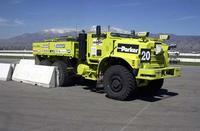
At the break of dawn on 13 March 2004, fifteen vehicles left a starting gate in the desert outside of Barstow, California, to make history in the DARPA Grand Challenge, a first-of-its-kind race to foster the development of self-driving ground vehicles. It is not easy to quantify the effects of these DARPA challenges on the development and deployment of autonomous vehicle technology, but ten years later defense and commercial applications are proliferating. The rapid evolution of the technology and rules for how to deploy it are being driven by the information technology and automotive industries, academic and research institutions, the Defense Department and its contractors, and federal and state transportation agencies.
-
-
China's share of rare earths minerals declining amid falling demand
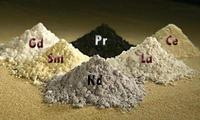
China still dominates the world’s rare earth elements market, but its share in global production has been steadily decreasing in recent years. A new study which shows a dramatic decline in these minerals’ prices has shaken he industry. In 2013, China accounted for 92.1 percent of high-tech rare earth oxides produced in the world. The percentage is still high, but it is a decline from 2010, when China accounted for 97.6 percent of global production of the mineral and fell to 95.1 percent in 2011.
-
-
Value of U.S. mineral production decreased in 2013
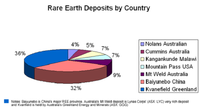
Last year, the estimated value of mineral production in the United States was $74.3 billion, a slight decrease from $75.8 billion in 2012. According to the U.S. Geological Survey’s annual Mineral Commodity Summaries 2014 report, the 2013 decrease follows three consecutive years of increases. Net U.S. exports of mineral raw materials and old scrap contributed an additional $15.8 billion to the U.S. economy.
-
-
Innovative solar-powered toilet to be unveiled in India next week
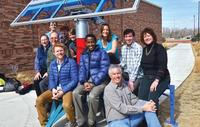
Unsafe methods to capture and treat human waste result in serious health problems and death — food and water tainted with pathogens from fecal matter results in the deaths of roughly 700,000 children each year. A revolutionary toilet fueled by the sun is being developed by University of Colorado Boulder researchers to help some of the 2.5 billion people around the world lacking safe and sustainable sanitation. It will be unveiled in India this month.
-
-
Radiation from Fukushima to reach West Coast in April
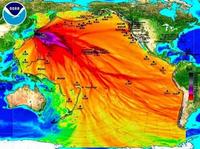
On the third anniversary of the Fukushima nuclear plant incident, scientists are reporting that low levels of radiation from the Fukushima plant will reach ocean waters along the U.S. West Coast by April 2014. The scientists say that the radiation will be at levels too low to harm humans, but they call for more monitoring, including at the federal level.
-
-
Iona College to Launch BS, BA, MS concentrations in cybersecurity
Iona College announced the launch in fall 2014 of undergraduate and graduate programs in computer science with a concentration in cyber security. The concentration will be offered for the Bachelor of Science, Bachelor of Arts, and the Master of Science degrees. The programs will provide students with fundamental cyber security skills, theoretical as well as hands-on experience. Students are exposed to new research ideas across many cyber security areas including software security, Web application security, mobile security, networking security, database security, and cryptography.
-
-
Wisconsin YES youth business plan contest helps promote STEM education
The number of skilled individuals needed in STEM industries is enormous, and growing, making it more and more crucial to promote the education of students in these disciplines. Wisconsin Yes! Aims to foster interest in science and tech education and encourages students to be independent, creative thinkers capable of problem solving. The statewide Wisconsin YES! youth business plan contest will close to entries 5 p.m. Monday, 17 March. Public, private, and home-schooled students across Wisconsin are eligible to turn their science- and tech-related ideas into business plans and compete for cash and prizes.
-
-
Examining fire safety concerns raised by green buildings
In 2012, the “Fire Safety Challenges of Green Buildings” report assembled a list of seventy-eight green building features and construction elements that could have implications for fire safety. The authors then derived a list of potential hazards associated with the features and elements, including greater flammability, faster burn rate, and increased hindrance to firefighters, as compared with conventional construction. A 3-year project, funded with a $1 million grant from DHS, will enable the further exploration of some of the potential risks and hazards identified in the 2012 report.
-
-
Determining long-term effects of West Virginia chemical spill
A chemical mixture called crude 4-methylcyclohexane methanol (MCHM) is used during the separation and cleaning of coal products. More than 10,000 gallons of the chemical leaked from a storage tank near Charleston, West Virginia, and entered the river upstream of a water-treatment plant on 9 January. The drinking water of more than 300,000 West Virginians was contaminated. Water restrictions began to be lifted on 13 January, but residents are still detecting the telltale odors of MCHM. Virginia Tech faculty engineers and students are unravelling fundamental chemical and health properties of MCHM.
-
-
“Encouraged” bacteria cleaning up more effectively after oil spills
Bioremediation is nature’s way of cleaning up. Plants, bacterial decomposers, or enzymes are used to remove contaminants and restore the balance of nature in the wake of pollution incidents. What is surprising is that given the right kind of encouragement, bacteria can be even more effective. Researchers in Norway have achieved surprising results by exploiting nature’s own ability to clean up after oil spills.
-
-
New technique allows better monitoring of water quality
Researchers have developed a new technique that uses existing technology to allow researchers and natural resource managers to collect significantly more information on water quality to better inform policy decisions. In addition to its utility for natural resource managers, the technique will also allow researchers to develop more sophisticated models that address water quality questions.
-
-
High level of “brain waste” among highly educated immigrants
Many highly educated immigrants coming to the United States without a job lined up have been unable to find work at their level of education, leading to considerable “brain waste,” researchers have found. The prevalence of such “brain waste” exceeded 40 percent for immigrants with a bachelor’s degree, 50 percent for those with a doctoral or professional degree, and 75 percent for those with a master’s degree.
-
-
Compact UV laser for biological, chemical detection
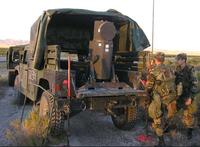
In addition to detecting chemical and biological agents in the field — or at home to protect against mass terror attacks — UV lasers have many other uses. The new class of UV lasers envisioned by DARPA’s Laser UV Sources for Tactical Efficient Raman (LUSTER) program is expected to be of use for a broad range of applications such as point-of-need medical diagnostics, advanced manufacturing, and compact atomic clocks.
-
-
Connecting individual K-12 STEM subjects for better results
A new report from the National Academy of Engineering and National Research Council examines current efforts to connect the science, technology, engineering, and mathematics (STEM) disciplines in K-12 education, both in formal classroom settings and informal learning environments, and suggests research to help determine the conditions most likely to lead to positive outcomes such as greater student retention and achievement, improved college-readiness skills, and increased interest in pursuing a STEM-related career.
-
-
Biometric security for mobile devices becoming mainstream
Biometric security such as fingerprint, face, and voice recognition is set to hit the mainstream as global technology companies market the systems as convenient and easy to use. The latest biometric technologies are not without their security issues, but they are marketed as more convenient than traditional methods rather than more secure, and encourage adoption by people who currently do not have any security on their phone at all.
-
More headlines
The long view
New Technology is Keeping the Skies Safe
DHS S&T Baggage, Cargo, and People Screening (BCP) Program develops state-of-the-art screening solutions to help secure airspace, communities, and borders
Factories First: Winning the Drone War Before It Starts
Wars are won by factories before they are won on the battlefield,Martin C. Feldmann writes, noting that the United States lacks the manufacturing depth for the coming drone age. Rectifying this situation “will take far more than procurement tweaks,” Feldmann writes. “It demands a national-level, wartime-scale industrial mobilization.”
How Artificial General Intelligence Could Affect the Rise and Fall of Nations
Visions for potential AGI futures: A new report from RAND aims to stimulate thinking among policymakers about possible impacts of the development of artificial general intelligence (AGI) on geopolitics and the world order.
Smaller Nuclear Reactors Spark Renewed Interest in a Once-Shunned Energy Source
In the past two years, half the states have taken action to promote nuclear power, from creating nuclear task forces to integrating nuclear into long-term energy plans.
Keeping the Lights on with Nuclear Waste: Radiochemistry Transforms Nuclear Waste into Strategic Materials
How UNLV radiochemistry is pioneering the future of energy in the Southwest by salvaging strategic materials from nuclear dumps –and making it safe.
Model Predicts Long-Term Effects of Nuclear Waste on Underground Disposal Systems
The simulations matched results from an underground lab experiment in Switzerland, suggesting modeling could be used to validate the safety of nuclear disposal sites.
